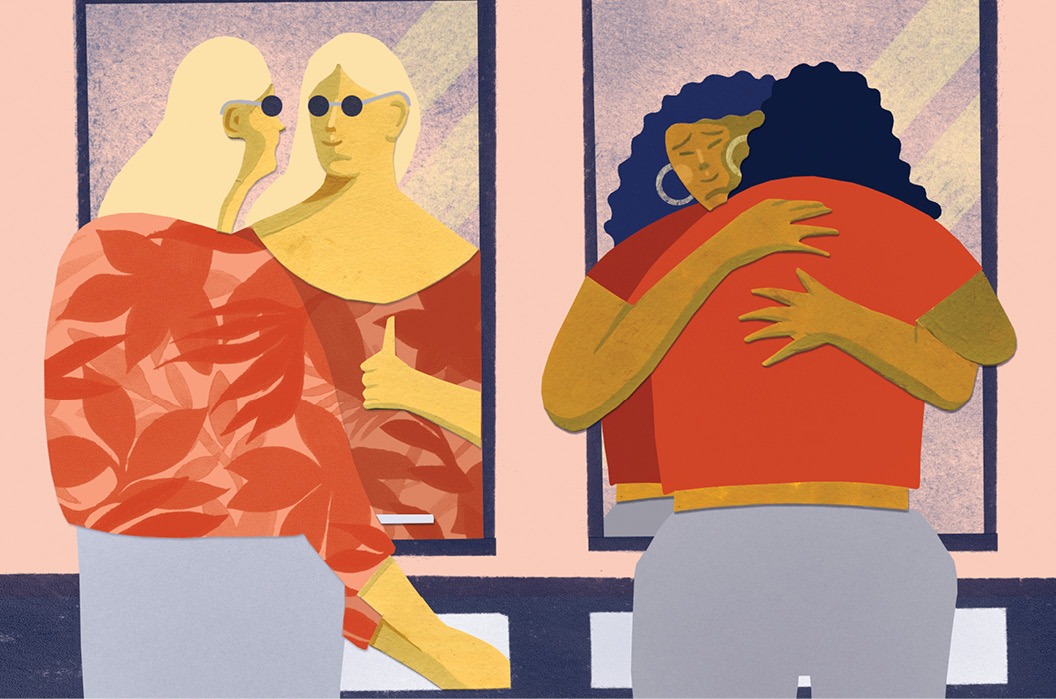What is self-acceptance, anyway?
I see it as being as honest as you can with yourself. It is the ability to take a long, hard look at yourself and see the original truth of who you are, as opposed to those self-judgements that you’ve learned from others, be they parents, siblings, friends or peers.
If that’s the case, can you say, hand on heart, that you’re happy with yourself? Can you look into a mirror and say: ‘I wouldn’t change a thing – about my looks, my thinking or my life?’ Or are you more likely to feel you’re not good enough or clever enough, whether that’s at work or in relationships? Perhaps you’re even being hard on yourself for not living up to your own (high) expectations, when you wanted everything to be perfect.
Not accepting yourself and dwelling on so-called negative aspects are often the result of early conditioning when other people can guide progress and judge you to be well or badly behaved. These judgements come to affect your own self-worth. Professor Leon Seltzer believes that children are able to accept themselves only to the degree they feel accepted by their parents. Writing in Psychology Today, he points to research showing that before the age of eight, children aren’t able to form a separate sense of self (other than that imposed on them by their guardians). ‘So we rely on others to give us a positive image of ourselves – and if we behave “badly”, and are disapproved of, that self-image can stick.’ If you beat yourself up, you’re just following the disapproval of your parents (and others).
Self-acceptance and self-esteem are not the same, insists Professor Seltzer. Self-esteem refers to how valuable or worthwhile you see yourself whereas self-acceptance alludes to a far more global affirmation of self. ‘When we’re self-accepting, we are able to embrace all facets of ourselves, not just the positive, more “esteem-able” parts… Self-acceptance is unconditional.’
It’s important to recognise weaknesses and faults, and this should not interfere with the ability to accept yourself. He encourages his therapy clients to explore what about themselves they haven’t been able to accept. ‘Liking ourselves has mostly to do with self-acceptance. Only when we stop judging ourselves can we secure a more positive sense of who we are.’

Make it happen
How do you unlock the self-acceptance gene? The first step must be recognising that your feelings about the world rest with yourself. Buddhism is already on this page – striving to be non-judgemental is one of its main tenets.
Says psychologist Tara Brach, the author of Radical Self-Acceptance: ‘The heart of Buddhism is compassion, and the heart of compassion is compassion for ourselves. It has to start with the life right here.’ Her concept involves ‘the process of accepting our actual, present-moment experience. Clearly recognising what is happening inside us and regarding what we see with an open, kind and loving heart.’ She says that when people stop judging themselves, ‘they become more accepting of others… By accepting the reality that is here and now, we… can draw on our inner courage, intelligence and compassion. It cuts to the root by acknowledging reality and connecting us with our deepest, most wise and loving self.’
Professor David Hamilton has studied the mental, emotional and physical effects of kindness and his book, I Heart Me: The Science of Self-love, is full of heartfelt wisdom. For those given to perfectionism, he suggests writing down the affirmation: ‘I am not my accomplishments and creations. Regardless of whether I win or lose, succeed or fail, the truth remains that I am enough.’ Ways to feel better about yourself, he says, could include deciding you’re going to learn to like yourself as you are; understanding that opinions are subjective – and they change; allowing yourself to be a square peg in a round hole; and focusing on what you like about yourself.
Really, the value of accepting oneself warts-and-all has been appreciated for millennia, as can be seen in a tract by 13th-century Sufi mystic poet Rumi: ‘This human being is a guest house. Every morning a new arrival. A joy, a depression, a meanness, some momentary awareness comes as an unexpected visitor. Welcome and entertain them all.’ Rumi writes of the ‘dark thought, the shame, the malice’, and suggests everyone ‘meet them at the door laughing and invite them in’. Perhaps accepting all aspects of ourselves is where true happiness lies.
- Words: Beverley D’Silva
- Illustrations: Olivia Waller @owaller
- Article extract from Breathe Issue 13. Buy the digital edition here. Find available back issues here.

